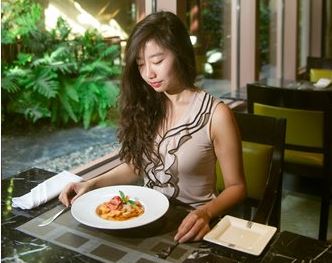
From the People's Daily app.
And this is Story in the Story.
According to a report from the National Health and Family Planning Commission, in the past 60 years, the average size of the Chinese family has decreased.
Compared with 2000, the number of single-person households has increased by almost 150 percent in cities, and 40 percent in rural areas.
In today's Chinese society, eating alone is no longer an indication of loneliness or sorrow, but rather an opportunity for self-reflection.
Dining in groups has always been a vital part of Chinese culture and social etiquette, but now younger generations are changing past perceptions and have embraced the option of ordering for one.
The reasons behind this phenomenon include late marriages, high divorce rates, prolonged longevity, changing family values, the growing number of people who choose to stay single and changing lifestyles.
Today's Story in the Story looks at 'solo-diners', an emerging demographic consisting of single people who prefer to eat alone.

More and more Chinese people have started to embrace the joy of dining alone. (Photo: GT)
Edie Zhang eats by herself three times a week on average. She is 26 years old, single, good-looking and well-dressed, and to many Chinese diners, she doesn't seem like the type who often eats alone.
But Zhang, who works for an artist agency and production house, eats alone sometimes when her "heart is tired" and she doesn't "really want to go home."
"Sometimes I like eating alone. I just don't want to talk,” she explained.
Zhang usually gets off work late, when few restaurants are open. She makes a tentative decision about where to eat, typically a quiet place that serves alcohol.
She said she doesn't care about how others look at her. "I usually focus entirely on eating. Sometimes I talk to the bartenders," she explained.
A restaurant in Amsterdam, the Netherlands, called Eenmaal, has also become well-known among Chinese internet users as it is believed to be the world's first one-person restaurant.
And the trend has caused the business world to take note.
Japanese retailer Muji began promoting a kitchen appliance line in 2014, which abandoned its original concept of "family," and started offering ovens, rice cookers, and electric kettles designed for single-person use.
Writer and food columnist Shen Hongfei said that in the new era, dining alone serves as a disconnection of one individual from Chinese society, which now has fewer traditional families, more late marriages, and people living alone.

Eenmaal, a restaurant in Amsterdam in the Netherlands, has caught attention from the media as it is believed to be the first one-person dining establishment in the world. (Photo: IC)
Sociologist Feng Gang at Zhejiang University said that while one-person restaurants and one-person kitchenware can be a selling point and business experiment, the association between eating and socializing hasn't changed and will not change in the future.
"The majority of Chinese might try solo eating sometimes. But eating alone is not the opposite of socializing. On the contrary, trying new one-person restaurants or watching videos about cooking for oneself is a method of participating in society," he said.
However, some feel there is a price to pay for the freedom that comes with being single and eating alone is one of them.
Chinese family life revolves around the dinner table, and the Chinese are used to eating big meals. According to tradition, dinner should consist of at least four dishes and a soup. While this is too much for one person to eat, many feel the experience of eating alone is also difficult to bear.
To help solo diners, Cai Yani, a former journalist from Shanghai, launched a video series called "Eating Alone.”
The mini-videos teach viewers how to cook simple but delicate meals. Shot beautifully in high definition, the videos feature a dish made by a well-dressed young man or woman inside a modern home.
The videos are played in taxis and broadcasted online. Through Cai’s project, she wants to prove that one can eat well even if one is alone.
"Before I was 30, my parents often interrogated me when I would get married, but after 30, they just stopped asking. On one hand, they were older and more concerned about themselves. On the other hand, they started to believe that I can live well by myself," she said.
(Produced by Nancy Yan Xu, Lance Crayon, Brian Lowe and Da Hang. Music by: bensound.com. Text from Global Times and China Daily.)


